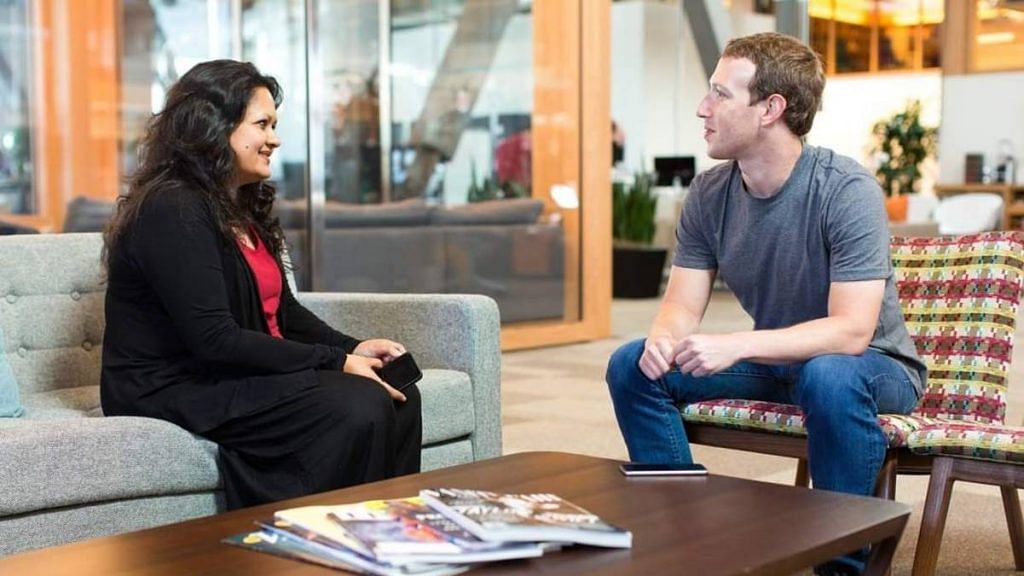New Delhi: Large companies like Facebook won’t allow one employee’s ideology to impact its final objective of profit maximisation but will work with those in power, whoever they may be, explained ThePrint’s Editor-in-Chief Shekhar Gupta in episode 552 of ‘Cut The Clutter’.
Facebook is not driven by an allegiance to any particular political party or political ideology but is driven by the company’s own need to increase profit and the need to maintain good relations with those in power in India, he said.
Referring to the recent allegations that the social media giant and its India policy head Ankhi Das had been partial to the BJP, Gupta explained that Facebook is not trying to please a particular political party but is only doing what it takes to continue doing business in its largest user base, India.
A 14 August Wall Street Journal report stirred a controversy after it claimed that “Ms Das has provided the BJP with favourable treatment on election-related issues”. The Congress party then wrote to Facebook CEO Mark Zuckerberg seeking a probe into its India operations.
“Facebook will salaam (salute) anybody who’s in power in the country. Today, the BJP is in power … any of these companies will let any Prime Minister of India hug them and they will do it with a big smile, irrespective of who the prime minister is because they want the Indian market. So if the Congress was in power, they will do the same thing to the Congress,” Gupta said.
Gupta said a company, which has a market cap of nearly $750 billion and functions as a superpower nation — that could even hire Nick Clegg, a former deputy prime minister of a ‘P5’ nation (one of five UNSC permanent members) like the UK, to run its public relations operations — won’t allow the company’s policy to be guided by just one employee’s ideology, as Das has been accused of by social media users aiming to establish Das’ affinity to right wing ideology.
“When you have a superpower mindset, you don’t let individual employees, no matter how powerful, how influential, how useful…, to guide your policy or to hijack your policy based on their own ideology.”
On the contrary, for companies like Facebook, with thousands of employees likely subscribing to differing ideologies, the objective is profit and everyone works towards it regardless of ideology, he said. “They’ll all work towards one common objective, which is profit maximisation and value maximisation for the shareholder, led in this case by Mark Zuckerberg himself.”
Also read: Facebook’s Ankhi Das says facing death threats, files police complaint after WSJ report row
Indian market value to Facebook
So why is India an important country for Facebook?
When it comes to business “prospects”, India will offer the largest set of content creators for Facebook since China does not allow the platform to operate there. The more content creators Facebook can bring onboard, the better it is for the company’s business prospects.
Hence, it would be in Facebook’s business interests to maintain cordial relations with the current Indian government.
But this isn’t just the case with India. “I don’t think a company like Facebook wants to be at odds with the ruling government of any country in the world…,” said Gupta.
He referred to how Facebook had made “concessions” even in smaller markets like Vietnam, adding they were neither “liberal” nor “right wing” concessions, but these were concessions made “so that they can continue working there”.
Also read: Why should I apologise? Have right to opinion, says BJP MLA in WSJ-Facebook controversy
The WSJ perspective
On allegations that Wall Street Journal had reported the story because it is a “left wing organization”, Gupta pointed to a July note WSJ had published to its readers.
It reassured readers that WSJ will continue to stick to its principles on its content regardless of its employees’ criticism of it, including criticism of an opinion article by US Vice President Mike Pence, largely seen as a conservative.
The note said its opinion pages offer an alternative to “uniform progressive views”, and that “most Journal reporters attempt to cover the news fairly and down the middle”.
Gupta said this offers perspective on the allegation that WSJ went after Facebook for alleged support to the right-wing BJP because the publication itself is left wing.
“It is the exact opposite of that,” said Gupta.
